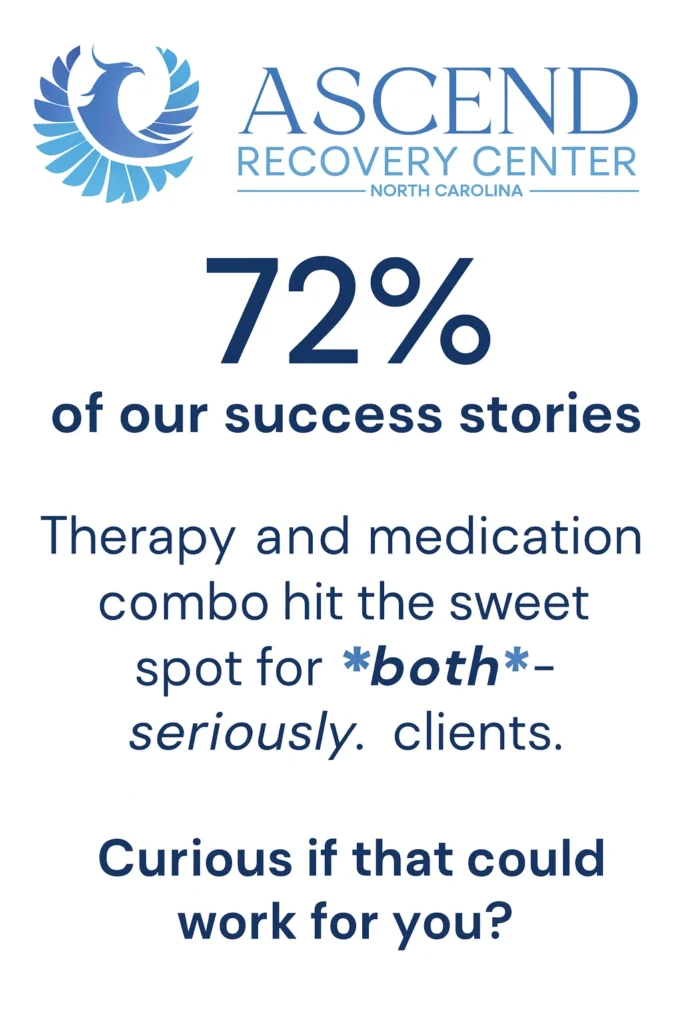When you start getting curious about your mental health, it’s rarely a straight line. Maybe you’re feeling more anxious than usual. Or your moods don’t make sense. Or the habits you once shrugged off aren’t working anymore.
You’ve read about therapy. Maybe seen someone you follow on Instagram post about meds. But when you try to figure out what’s right for you, it feels like trying to pick a lock in the dark.
Here’s the truth: you don’t have to have it all figured out before reaching out for help. If you’re exploring mental health treatment in Charlotte, North Carolina, Ascend Recovery Center offers both therapy and medication services in a way that’s collaborative—not prescriptive. You stay in the driver’s seat. We’re just here to help you see the road a little more clearly.
Start Here: Something Feels Off—Now What?
Not every mental health journey starts with a diagnosis. Sometimes it starts with a voice in your head that whispers: “This isn’t working anymore.”
It could be:
- You’re constantly irritable or on edge
- You sleep too much—or not at all
- You’ve lost interest in things you used to love
- You feel emotionally flat or overwhelmed all the time
- You’re drinking more, scrolling more, numbing more
Even if your life looks fine on the outside, that doesn’t mean you’re okay inside. And you don’t have to wait until things fall apart to ask for support. Being sober curious or mental-health curious is more than enough reason to explore treatment.
What Therapy Can Offer (Besides Just Talking)
A lot of people assume therapy is just talking about your feelings—and yes, that’s part of it. But good therapy helps you make sense of your feelings. It gives you a mirror and a map.
At Ascend North Carolina, therapy might include:
- Exploring the roots of anxiety, depression, or burnout
- Learning how to set boundaries (without guilt)
- Reframing unhelpful thought patterns
- Building emotional skills you didn’t learn growing up
- Connecting dots between your past and your present behaviors
Therapy is especially powerful if you:
- Feel emotionally overwhelmed
- Can’t figure out why you feel “off”
- Want to understand your behavior—not just stop it
- Need a safe, neutral space to be fully honest
Some clients at Ascend begin therapy even before they’re sure what they need. And that’s the point: therapy can help you figure that out.
What Medication Might Help With
Let’s bust a myth: choosing to try medication doesn’t mean you’ve “failed” at managing your mental health naturally. It just means your brain might need biological support to do the deeper work.
Medication isn’t about numbing out—it’s about tuning your brain chemistry so that:
- Your anxiety doesn’t control your day
- You can actually sleep through the night
- Your depressive fog lifts enough to take action
- Your energy and focus feel more consistent
At Ascend, medication decisions are made with you, not for you. The team listens to your fears, explains your options clearly, and checks in regularly. It’s a conversation, not a prescription pad being handed over.
And yes—meds can be temporary. Or long-term. Or not at all. You choose.
Why Therapy and Medication Together Often Work Best
Think of it like this:
Medication is the tool. Therapy teaches you how to build.
A lot of people find that when they combine therapy and medication, the results stick better. Medication helps stabilize your mind so therapy doesn’t feel like trying to run a marathon with weights on.
Therapy helps you explore the “why” behind your struggles. Medication helps create the capacity to do something with those insights.
And if you ever feel like you’re “cheating” by taking meds—consider this: No one shames someone for using glasses to see clearly. Why shame someone for using support to feel clearly?

You Don’t Have to Decide Everything Today
Let’s be honest—choosing how to take care of your mental health can feel overwhelming. Especially when you’re the kind of person who’s always been the helper, the high-achiever, or the one who “has it all together.”
But here’s something powerful:
You don’t have to have a full plan to take a first step.
At Ascend Recovery Center in Charlotte, you can book an initial conversation without committing to anything. No pressure. No labels. Just a chance to talk through how you’re feeling—and what support could look like.
You’ll never be pushed into therapy or medication. You’ll be heard, first.
Quick Tips for Mental Health Decision-Making
Ask yourself:
- Am I ready to be emotionally honest—even if it’s awkward?
- Do I want more insight (therapy), more stability (meds), or both?
- Would talking to someone help clarify things?
- What’s stopping me from getting support? Can I name it?
Small steps you can take today:
- Write down how you’ve been feeling for the past two weeks
- Talk to a friend who’s been to therapy or tried medication
- Schedule a low-pressure consultation
- Explore mental health resources in North Carolina
Remember: curiosity is a sign of readiness. You don’t have to crash to start climbing.
FAQ: Therapy, Medication, and Mental Health Treatment
Is therapy or medication more effective?
It depends on your needs. For some, therapy alone is enough. Others benefit from a combined approach. Many people at Ascend use both and adjust over time.
Will I have to take medication forever?
Not necessarily. Some people use medication short-term, while others find long-term benefits. Your care team will work with you to review and adjust based on how you’re feeling.
What if I start therapy and it doesn’t help?
It’s okay to not click with the first therapist you meet. Ascend’s team helps match you with someone who fits your goals and personality—and supports you in trying something new if needed.
Do I need a diagnosis to get help?
Absolutely not. Many people start therapy simply because life feels heavier than it should. Diagnosis may be part of treatment—but it’s not a barrier to beginning.
I’m scared of side effects from medication. What should I do?
That’s valid. Talk openly with your prescriber. They’ll explain risks, benefits, and what to expect. You’ll never be forced to take something you’re not comfortable with.
You’re Allowed to Ask for More
You don’t need a crisis to deserve care. You don’t need a label to be taken seriously. If something inside you is whispering, “It’s time,”—listen.
📞 Call (844) 628-9997 or visit Ascend Recovery Center’s Mental Health Treatment page to learn more about therapy, medication, or both in Charlotte, North Carolina.
You’re not broken. You’re becoming.


